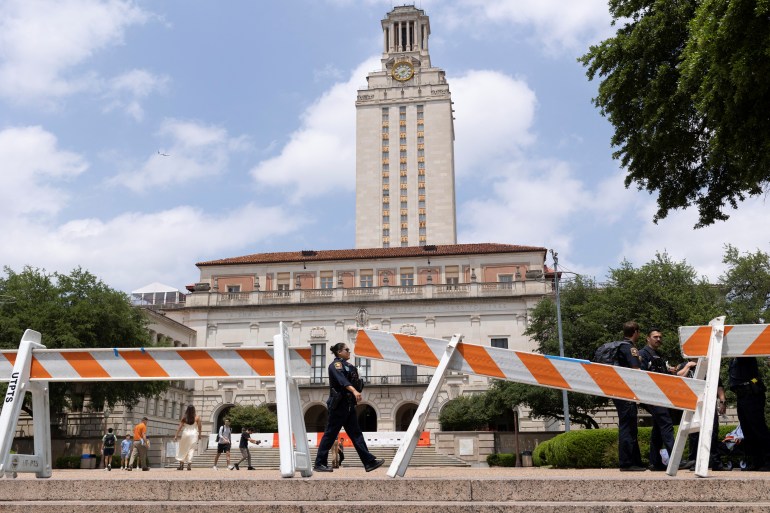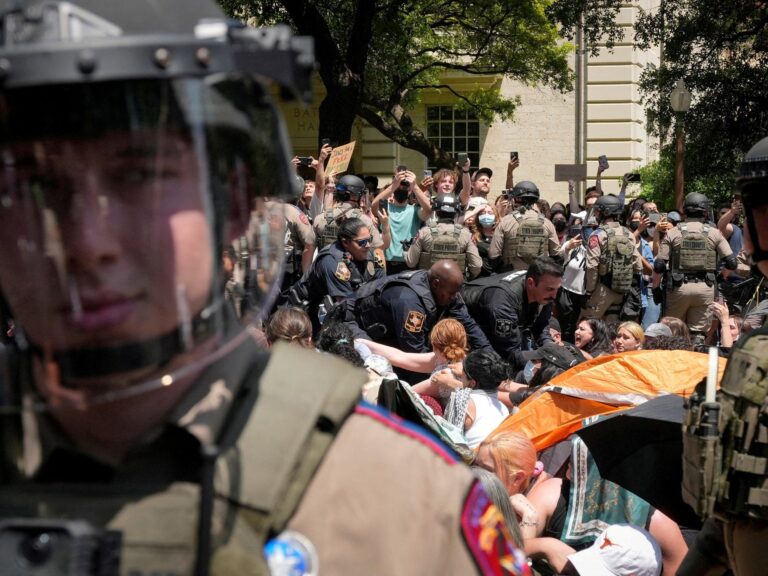Austin, TX – “It didn’t seem real.” This is how Alishba Javaid, student at the University University of Texas at Austindescribes the moment she saw about 30 state troopers walking across the campus lawn.
Javaid and hundreds of his classmates had gathered on the grass, in the shadow of the campus’ 94-meter limestone tower, as part of a protest against Israel’s war in Gaza.
They hoped that their school would part with manufacturers supplying weapons to Israel. Instead, law enforcement began showing up in increasing numbers.
According to Javaid, the state troopers joined at least 50 fellow officers already in place, all dressed in riot gear. The protest was peaceful, but nerves were high. The soldiers continue their advance.
“That was the first moment I was really scared,” Javaid, 22, said.
Dozens of students were eventually arrested on April 24, as police attempted to disperse the protesters. Pictures clashes between police and demonstrators quickly spread on the Internet, echoing pictures from other protests on campus across the United States.
Yet Texans face a unique challenge, as they face a far-right government that seeks to limit anti-Israel protests.
In 2017, Governor Greg Abbott signed a law which prohibits government entities from working with companies that boycott Israel, and the state has since taken steps to further strengthen this law.
Abbott also called the current protests “hateful” and “anti-Semitic,” amplifying misconceptions about the protesters and their goals.
Additionally, a state law that took effect earlier this year forced public universities to close their diversity, equity and inclusion (DEI) offices.
Several students and staff told Al Jazeera that campuses have become less safe for people of color because of the law, which forced the departure of DEI staff advocates.

“Using violence to overthrow minorities”
Violence has continued on University of Texas campuses as students continue their protests.
On the last day of classes, April 29, police used pepper spray and flash bang devices to clear out a crowd on the Austin campus, while dozens of others were surrounded by soldiers and taken away screaming.
Hiba Faruqi, a 21-year-old student, said her knee “wouldn’t stop bleeding” after she was knocked down during a stampede between students and police.
Still, she considers herself lucky not to have suffered more serious injuries. It was surreal, she said, to think that her own university was calling in state troopers — and then having to deploy medical personnel to help injured students.
“There’s a racist element that people don’t want to talk about here,” she said. “There is a xenophobic element that people don’t want to acknowledge. There are more brown protesters, which perhaps encourages the police to act in a certain way.”
As calls for divestment continue, students, lawyers and advocates told Al Jazeera they have been forced to contend with skepticism and outright hostility from the Texas government.
“Texas is known for using violence to overthrow minorities,” Faruqi said. “The reason it’s shaking people up this time is because it’s not working.”

Control of university endowments
Many protests have focused on the University of Texas endowment, a bank of funds intended to support its nine campuses over the long term.
The University of Texas System has the largest public education endowment in the nation, worth more than 40 billion dollars.
Some of that money comes from investments in arms and defense companies, as well as aerospace, energy and defense technology companies with deep ties to Israel.
ExxonMobil, for example, is one of the largest beneficiaries of the system’s investments, and the company has supplied Israel with fuel for its fighter jets.
Those ties have fueled protests on public college campuses across the state, including a May 1 demonstration at the University of Texas at Dallas.
Fatima – who only shared her first name with Al Jazeera out of fear for her safety – was among the protesters. She wiped sweat from her brow as a young child led the crowd of about 100 people in a series of chants: “Free Palestine, free, free!” »
Pro-divestment protests have been largely peaceful, Fatima said, raising her voice to be heard above the noise.
“More than 30,000 people have been murdered,” she said, referring to the death toll in Gaza, where the Israeli military campaign is entering its eighth month.
“And our university invests in weapons manufacturing companies that supply these weapons to Israel. We will stay here until our demands are met.
Twenty-one students and staff members were arrested that day in Dallas. Members of the Students for Justice in Palestine group, of which Fatima is a member, spent the night outside the county jail, waiting for their friends to be released.
A protester wryly remarked outside the jail that they had been arrested for trespassing on their own campus, a seemingly senseless offense.
In the background, a storm was starting to brew, so the demonstrators gathered under the awning.

Texas officials and university administrators have justified police are cracking down, in part, citing the presence of foreigners with no current affiliation with the campuses involved.
But activist Anissa Jaqaman, 30, is among those visiting the university protests, aiming to provide materials and support.
Everyone has a role to play, explains Jaqaman: Her role is sometimes that of the communicator, but more often that of the healer.
She brought water to student protesters at the University of Texas at Dallas and hopes to provide a space where people can “come and talk about how we heal.”
“This is a healing movement,” she said repeatedly during her speech to Al Jazeera. “We have to carry each other.”
Jaqaman is a Texan through and through: she grew up in the Dallas suburbs and is a staunch advocate for her state.
“I’m a proud Texan,” she said. “I actually think Texans are some of the nicest people in the country.”
But when she was in college, from 2012 to 2016, Jaqaman began using her voice to raise awareness about the plight of the Palestinians.
Rights groups have long warned that Israel has imposed a apartheid system against the ethnic group, subjecting its members to discrimination and displacement.
At university, Jaqaman’s friends often made fun of his passion. She smiles often, exuding optimism, but her voice turns serious when she talks about Palestine, as well as other issues like the scourge of single-use plastics.
“They just thought I was a defender of trees, but I was a defender of human rights,” she explained in a soft but confident voice.
But the current war has amplified his concerns. The United Nations reported famine is “imminent” in parts of Gaza, and rights experts have highlighted a “risk of genocide» in the Palestinian enclave.
Jaqaman has worn her keffiyeh since the war began on October 7, even though she fears it could lead to violence against her.
“I wear it because I feel like it protects my heart, honestly,” she said. “I feel like I’m doing an injustice to the Palestinian people by not wearing it.”
But she has struggled to convince public officials to raise concerns about the war and divestment from industries linked to the Israeli military. For months, she tried to persuade her local city council that “this is a human issue, an issue that concerns everyone,” to no avail.
“Everything we are seeing right now is aimed at shutting down the discussion,” she said. “If you say anything about Palestine, you are called anti-Semitic. That’s the end of the conversation.

Young protesters look to the future
Students like Javaid, a journalism major in her final semester, told Al Jazeera they are still trying to understand what healing looks like – and what their future might hold. In many ways, she and her friends feel stuck.
They recognize that they need to take a break from searching for information about the war on social media, and yet it’s all they can think about.
The usual rites of passage to college – final exams, graduation, and job hunting – no longer seem as important.
“How are we supposed to get back to work now? » Javaid asked after the protests.
Although she enjoyed her time at the university, she is also very critical of the measures taken to quell the protests. But part of the blame, she added, lies with the government.
“The fundamental problem in Texas is that the state government doesn’t care,” she said.
Born and raised in the Dallas area, Javaid plans to stay in Texas for at least a little while after graduating this month. She has mixed feelings about staying long-term, however.
She would like to work in the social justice field, particularly in higher education, but she worries that such employment would be precarious in her home country.
However, she feels a sense of responsibility that binds her to the State. The political climate in Texas may be difficult, she said, but she has a duty — to her fellow protesters and to Palestine — to continue to play a role.
“I don’t want to jump ship and just say, ‘Texas is crazy,’” Javaid said. “I want to be one of the people who tries to make things better. Because if not us, who?


